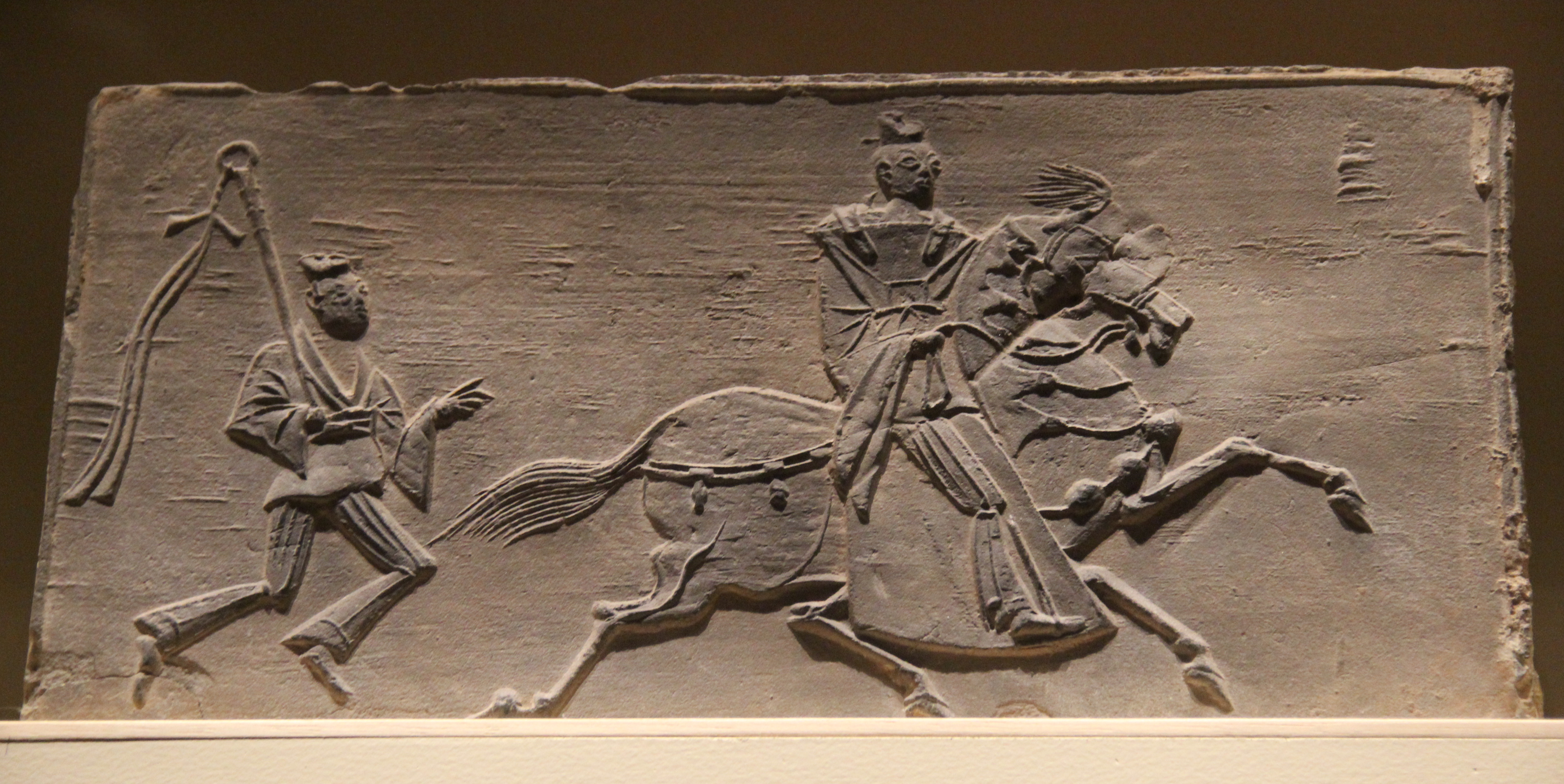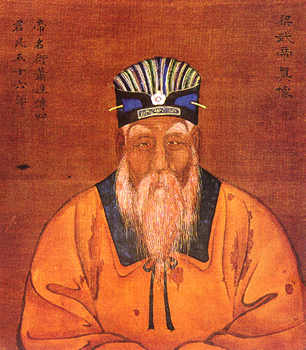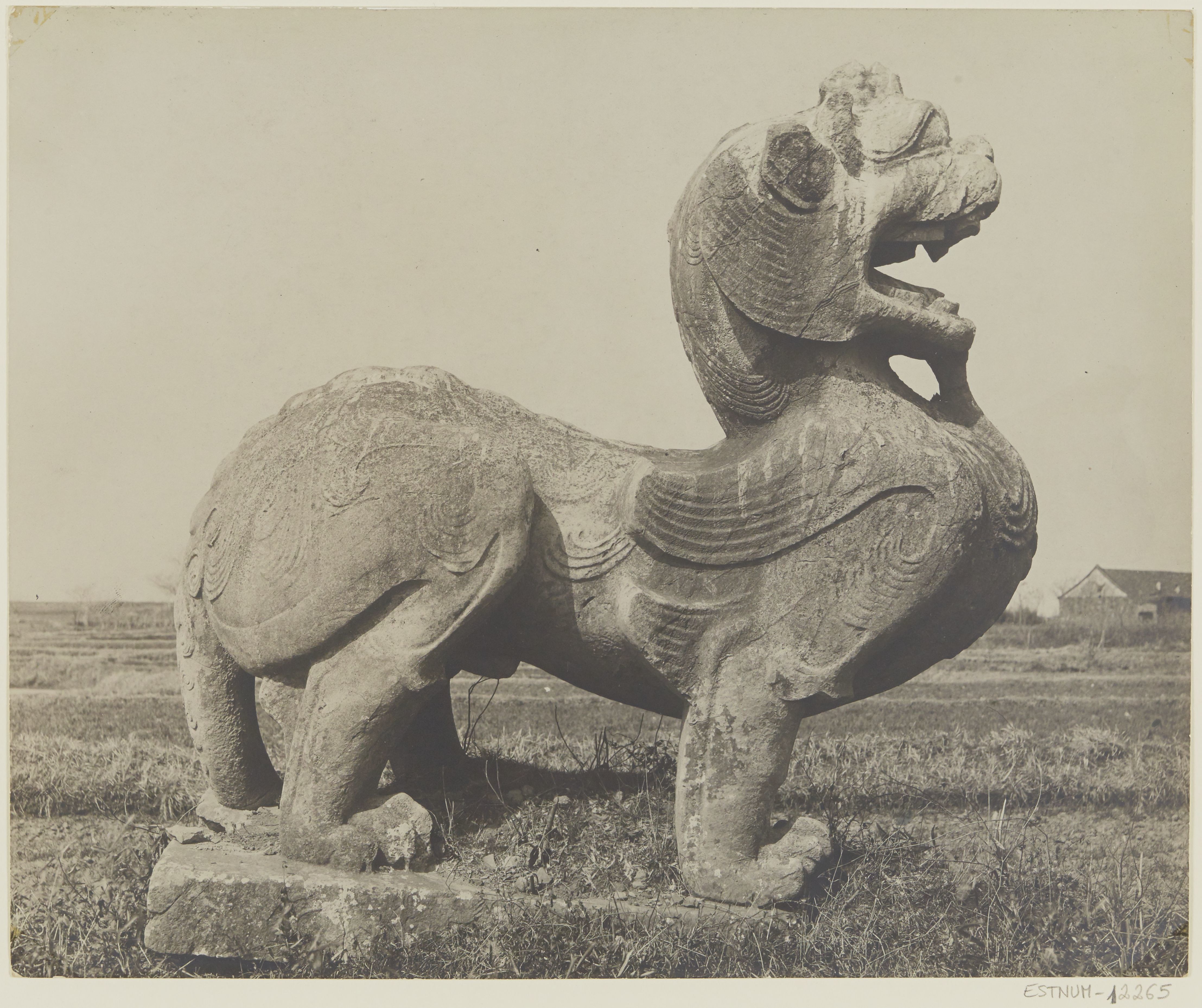|
Ding Lingguang
Ding Lingguang (丁令光; 485 – 3 January 527), formally known as Empress Dowager Mu (穆皇太后), was an imperial concubine of Xiao Yan, Emperor Wu of Liang Dynasty. She was a native of Qiao County (谯国), today's Bozhou City, Anhui Province. Life Ding Lingguang was born a commoner in Qiao County. A legend details that when she was born, light filled the room. At age fourteen, Xiao Yan, then Governor of Yongzhou (雍州刺史), fell in love with her. Her parents broke Ding's then-engagement and offered her as a concubine to Xiao Yan. In September or October 501, Concubine Ding gave birth to her first child, a son, named Xiao Tong (蕭統). In April of the next year, Xiao Yan established the Liang dynasty. He awarded Ding the title of Noble Imperial Concubine, one of the highest titles held by women in Liang Dynasty. Her only son at that time, Xiao Tong, was made Crown Prince (皇太子).《南史·卷十二·列传第二》:贵嫔父道迁,天监初,为历阳太� ... [...More Info...] [...Related Items...] OR: [Wikipedia] [Google] [Baidu] |
Southern Qi
Qi, known in historiography as the Southern Qi ( or ) or Xiao Qi (), was a Chinese imperial dynasty and the second of the four Southern dynasties during the Northern and Southern dynasties era. It followed the Liu Song dynasty and was succeeded by the Liang dynasty. The main polity to its north was the Northern Wei. History The dynasty began in 479, when Xiao Daocheng forced the Emperor Shun of Liu Song (宋顺帝) into yielding the throne to him, ending Liu Song and starting Southern Qi, as its Emperor Gao. The dynasty's name was taken from Xiao's fief, which roughly occupied the same territory as the Warring States era Kingdom of Qi. The Book of the Qi does not mention whether or not Xiao had any blood relationship to either the House of Jiang or House of Tian, the two dynasties which had previously ruled that kingdom. During its 23-year history, the dynasty was largely filled with instability, as after the death of the capable Emperor Gao and Emperor Wu, Empe ... [...More Info...] [...Related Items...] OR: [Wikipedia] [Google] [Baidu] |
Bozhou
Bozhou () is a prefecture-level city in northwestern Anhui province, China. It borders Huaibei to the northeast, Bengbu to the southeast, Huainan to the south, Fuyang to the southwest, and Henan to the north. Its population was 4,996,844 at the 2020 census, of whom 1,537,231 lived in the built-up area made of Qiaocheng urban district, even though the county remains largely rural. Administration The prefecture-level city of Bozhou currently administers 4 county-level divisions, including 1 district and 3 counties. * Qiaocheng District () * Guoyang County () * Lixin County () * Mengcheng County () Geography and climate Bozhou features a monsoon-influenced humid subtropical climate (Köppen ''Cwa'') with four distinct seasons. With an annual mean temperature of , the monthly 24-hour average temperature ranges from in January to in August. Winters are damp and cold (yet the precipitation is low) while summers are hot and humid. Rainfall is heavily concentrated in the war ... [...More Info...] [...Related Items...] OR: [Wikipedia] [Google] [Baidu] |
Anhui
Anhui is an inland Provinces of China, province located in East China. Its provincial capital and largest city is Hefei. The province is located across the basins of the Yangtze and Huai rivers, bordering Jiangsu and Zhejiang to the east, Jiangxi to the south, Hubei and Henan to the west, and Shandong to the north. With a population of 61 million, Anhui is the 9th most populous province in China. It is the 22nd largest Chinese province based on area, and the 12th most densely populated region of all 34 Chinese provincial regions. Anhui's population is mostly composed of Han Chinese. Languages spoken within the province include Lower Yangtze Mandarin, Wu Chinese, Wu, Huizhou Chinese, Hui, Gan Chinese, Gan and small portion of Central Plains Mandarin. The name "Anhui" derives from the names of two cities: Anqing and Huizhou, Anhui, Huizhou (now Huangshan City). The abbreviation for Anhui is , corresponding to the historical , and is also used to refer to the Wan River and Mount Ti ... [...More Info...] [...Related Items...] OR: [Wikipedia] [Google] [Baidu] |
Liang Dynasty
The Liang dynasty (), alternatively known as the Southern Liang () or Xiao Liang () in historiography, was an imperial dynasty of China and the third of the four Southern dynasties during the Northern and Southern dynasties period. It was preceded by the Southern Qi dynasty and succeeded by the Chen dynasty. The rump state of Western Liang existed until it was conquered in 587 by the Sui dynasty. Rule During the Liang dynasty, in 547 a Persian embassy paid tribute to the Liang, amber was recorded as originating from Persia by the '' Book of Liang''. In 548, the Prince of Henan Hou Jing started a rebellion with Xiao Zhengde, the Prince of Linhe, nephew and a former heir of the Emperor Wu of Liang, and installed Xiao Zhengde as emperor. In 549, Hou sacked Jiankang, deposed and killed Xiao Zhengde, seized power and put Emperor Wu effectively under house arrest. He dismissed the armies opposed to him in the name of Emperor Wu. In 549, Emperor Wu died; Emperor Wu's third ... [...More Info...] [...Related Items...] OR: [Wikipedia] [Google] [Baidu] |
Emperor Wu Of Liang
Emperor Wu of Liang () (464 – 12 June 549), personal name Xiao Yan (蕭衍), courtesy name Shuda (叔達), childhood name Lian'er (練兒), was the founding Emperor of China, emperor of the Chinese Liang dynasty, during the Northern and Southern dynasties period. His reign, until its end, was one of the most stable and prosperous among the Southern dynasties. He came from the same Xiao clan of Lanling (蘭陵蕭氏) that ruled the preceding Southern Qi, Southern Qi dynasty, but from a different branch. Emperor Wu established universities and extended the Confucian civil service exams, demanding that sons of nobles (士族) study. He was well read himself and wrote poetry and patronized the arts. Although for governmental affairs he was Confucian in values, he embraced Buddhism as well. He himself was attracted to many Indian traditions. He banned the sacrifice of animals and was against execution (legal), execution. It was said that he received the Buddhist precepts during his r ... [...More Info...] [...Related Items...] OR: [Wikipedia] [Google] [Baidu] |
Xiao Tong
Xiao Tong (, October 501 – 7 May 531), courtesy name Deshi (), formally Crown Prince Zhaoming (昭明太子, literally "Accomplished and Understanding Crown Prince"), was a crown prince of the Chinese Liang dynasty, posthumously honored as Emperor Zhaoming (). He was the oldest son and heir apparent of Emperor Wu of Liang, whom he predeceased. Xiao Tong's enduring legacy is the literary compendium ''Wen Xuan'' (''Selections of Refined Literature''). Birth and childhood Xiao Tong was born to Xiao Yan, then a Southern Qi general nearing final victory in a civil war against the cruel and violent emperor Xiao Baojuan, in winter 501. He was born at Xiao Yan's power base of Xiangyang, to Xiao Yan's concubine Ding Lingguang (). (Xiao Yan's wife Chi Hui () had died in 499, and from that point on he had only concubines and never made any of them his wife.) After Xiao Yan's victory later in 501, he forced Emperor He of Southern Qi, whom he had supported as a rival claimant to the ... [...More Info...] [...Related Items...] OR: [Wikipedia] [Google] [Baidu] |
Emperor Jianwen Of Liang
Emperor Jianwen of Liang (梁簡文帝; 2 December 503 – 551), personal name Xiao Gang (蕭綱), courtesy name Shizuan (世纘), childhood name Liutong (六通), was an emperor of the Chinese Liang Dynasty. He was initially not the crown prince of his father Emperor Wu, the founder of the dynasty, but became the crown prince in August 531 after his older brother Xiao Tong died. In 549, the rebellious general Hou Jing captured the capital Jiankang, and Hou subsequently held both Emperor Wu and Crown Prince Gang under his power, having Crown Prince Gang take the throne (as Emperor Jianwen) after Emperor Wu's death later that year. During Emperor Jianwen's reign, he was almost completely under Hou's control, and in 551, Hou, planning to take the throne himself, first forced Emperor Jianwen to yield the throne to his grandnephew Xiao Dong the Prince of Yuzhang, and then sent messengers to suffocate the former emperor. Background Xiao Gang was born in 503, as the third son of ... [...More Info...] [...Related Items...] OR: [Wikipedia] [Google] [Baidu] |
Liang Dynasty
The Liang dynasty (), alternatively known as the Southern Liang () or Xiao Liang () in historiography, was an imperial dynasty of China and the third of the four Southern dynasties during the Northern and Southern dynasties period. It was preceded by the Southern Qi dynasty and succeeded by the Chen dynasty. The rump state of Western Liang existed until it was conquered in 587 by the Sui dynasty. Rule During the Liang dynasty, in 547 a Persian embassy paid tribute to the Liang, amber was recorded as originating from Persia by the '' Book of Liang''. In 548, the Prince of Henan Hou Jing started a rebellion with Xiao Zhengde, the Prince of Linhe, nephew and a former heir of the Emperor Wu of Liang, and installed Xiao Zhengde as emperor. In 549, Hou sacked Jiankang, deposed and killed Xiao Zhengde, seized power and put Emperor Wu effectively under house arrest. He dismissed the armies opposed to him in the name of Emperor Wu. In 549, Emperor Wu died; Emperor Wu's third ... [...More Info...] [...Related Items...] OR: [Wikipedia] [Google] [Baidu] |
Emperor Wu Of Southern Qi
Emperor Wu of Southern Qi (南齊武帝) (440– 27 August 493), personal name Xiao Ze (蕭賾), courtesy name Xuanyuan (宣遠), childhood name Long'er (龍兒), was the second emperor of the Chinese Southern Qi dynasty. He is generally considered to be an able and diligent emperor, although he is also criticized for leading a lavish lifestyle. Background Xiao Ze was born in the Liu Song capital Jiankang in 440, when his father Xiao Daocheng was just 13 years old. He was the oldest son of his father, and his mother Liu Zhirong was Xiao Daocheng's wife. By 466, when Xiao Daocheng was a Liu Song general, Xiao Ze was a county magistrate at Gan County (贛縣, in modern Ganzhou, Jiangsi), when he was stuck in the civil war between Emperor Ming, whose claim his father Xiao Daocheng supported, and Emperor Ming's nephew Liu Zixun, who also claimed the throne. Because of Xiao Daocheng's support for Emperor Ming, Xiao Ze, who was deep in the territory controlled by Liu Zixun, was ... [...More Info...] [...Related Items...] OR: [Wikipedia] [Google] [Baidu] |
Xiao Baojuan
Xiao Baojuan (蕭寶卷) (483 – 31 December 501), né Xiao Mingxian (蕭明賢), commonly known by his posthumously demoted title of Marquess of DonghunThe term "Donghun" (東昏) does not denote a place, but a derogatory description of Xiao Baojuan. Historically, the Chinese word "Hun" (昏), when used to describe rulers, means "incompetent" or "mediocre". In that context, the title "Marquess of Donghun" can be translated as the "Eastern Incompetent Marquess". (東昏侯), courtesy name Zhizang (智藏), was an emperor of the Southern Qi dynasty of China, during the Northern and Southern dynasties period. He was a violent ruler who executed high-level officials at his whim, and this drew several major rebellions, the last of which, by his general Xiao Yan, overthrew him and eventually his dynasty, with Xiao Yan establishing the Liang dynasty. He is known as the Marquess of Donghun because Xiao Yan demoted him to that title after he was killed in a siege of the capital Jiankang ... [...More Info...] [...Related Items...] OR: [Wikipedia] [Google] [Baidu] |
480s Births
48 may refer to: * 48 (number) * one of the years 48 BC, AD 48, 1948, 2048 * ''48'' (novel) * ''48'' (magazine) * "48", a song by Tyler, the Creator from the album ''Wolf'' * 48, a phone network brand of Three Ireland * "Forty Eight", a song by Karma to Burn from the album '' V'', 2011 * 48 Doris, a main-belt asteroid * Tucker 48 The Tucker 48, commonly but incorrectly referred to as the Tucker Torpedo, was an Car, automobile conceived by Preston Tucker while in Ypsilanti, Michigan, and briefly produced in Chicago, Chicago, Illinois, in 1948. Only 51 cars were made inclu ..., a sedan See also * A48 (other) {{number disambiguation ... [...More Info...] [...Related Items...] OR: [Wikipedia] [Google] [Baidu] |
526 Deaths
__NOTOC__ Year 526 ( DXXVI) was a common year starting on Thursday of the Julian calendar. At the time, it was known as the Year of the Consulship of Olybrius without colleague (or, less frequently, year 1279 ''Ab urbe condita''). The denomination 526 for this year has been used since the early medieval period, when the Anno Domini calendar era became the prevalent method in Europe for naming years. Events By place Europe * August 30 – King Theodoric the Great dies of dysentery at Ravenna; his daughter Amalasuintha takes power as regent for her 10-year-old son Athalaric. * Amalasuintha rules the Ostrogothic Kingdom that extends throughout the Italian Peninsula, Dalmatia, Sicily, Sardinia and Corsica. * Amalaric, age 24, becomes king of the Visigoths, and assumes full royal power. Persia * Roman–Persian Wars: King Kavad I, assisted by his Arabian vassal, Al-Mundhir III, begins a campaign in the Transcaucasus region and Upper Mesopotamia. Middle East * ... [...More Info...] [...Related Items...] OR: [Wikipedia] [Google] [Baidu] |




